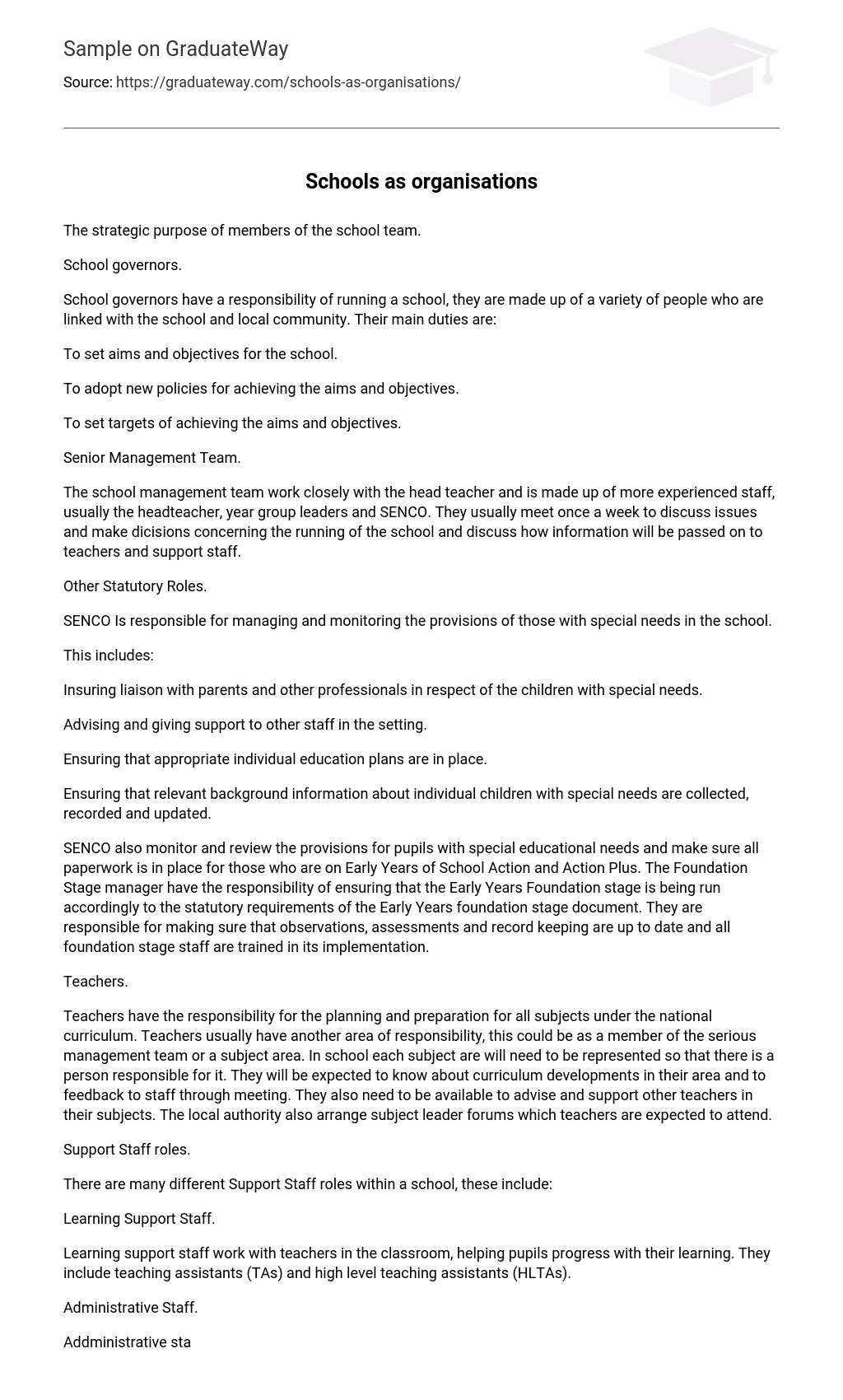The school team members have a specific goal.The text “School governors.” remains the same.
School governors have the responsibility of managing the school and are composed of individuals associated with the school and its local community. Their main tasks include:
To establish goals and objectives for the school.
Implementing innovative methods to accomplish goals and objectives.
Establishing goals is essential in order to accomplish the aims and objectives.
The Senior Management Team.
The school management team, consisting of the headteacher, year group leaders, and SENCO, collaborates with the head teacher to meet weekly. Their meetings involve discussing school matters, making decisions, and determining how information will be communicated to teachers and support staff.
Additional Statutory Roles.
The school’s SENCO is in charge of overseeing and supervising the support provided for students with special needs.
Essentially, this includes the following:
Ensuring communication and collaboration with parents and other professionals regarding children with special needs.
Assisting and offering aid to colleagues within the workplace.
Ensuring the implementation of appropriate individual education plans.
It is essential to collect, record, and update significant background information on individual children with special needs.
SENCO is responsible for overseeing and assessing the support provided to students with special educational needs, as well as ensuring proper documentation for those in Early Years of School Action and Action Plus. The Foundation Stage manager ensures compliance with statutory requirements outlined in the Early Years foundation stage document, including proper operation of the Early Years Foundation stage. Additionally, they maintain up-to-date observations, assessments, and record-keeping practices while providing training to all foundation stage staff on implementing these requirements.
Teachers play a crucial role in the education system.
Teachers are responsible for planning and preparing all subjects in the national curriculum. They may also have additional responsibilities, such as being part of the senior management team or overseeing a specific subject area. It is important to have someone in the school who is accountable for each subject to ensure proper representation. These individuals must stay updated on curriculum developments and communicate with staff through meetings. Additionally, they should offer guidance and support to fellow teachers in their respective subjects. The local authority arranges forums for subject leaders that teachers must attend.
The responsibilities of support staff.
Within a school, there are various support staff roles, including:
Learning Support Staff.
Teaching assistants (TAs) and high level teaching assistants (HLTAs) collaborate with teachers in the classroom to assist students’ educational development.
Members of the administrative staff.
The entire school relies on administrative staff for crucial support and essential services.
Staff members dedicated to welfare and support.
One of the responsibilities of pupil support staff is to supervise pupils during non-classroom hours, including break time, lunchtime, and after school hours.
Staff members provide specialized and technical support.
Schools have specialized support staff who offer technical assistance and provide resources for teaching and learning.
Staff members on the site.
Site staff in schools play a crucial role in maintaining the cleanliness, safety, and tidiness of the premises. They also ensure that meals are served during lunchtimes.
There is a wide variety of external professions that may collaborate with a school, which include:
Education Psychologist, assisting the SENCO in conducting assessments and observations for pupils with additional needs.
Speech and Language Therapists will collaborate with pupils on speech, language, and communications, assisting in both producing and understanding language.
Specialist Teachers provide guidance and assistance to students with diverse needs, including behavioural, social, and communication challenges like autism and English as a second language.
The Educational Welfare officers visit schools and collaborate with the Head teacher to monitor pupils attendance. They also provide support with issues around abstence and work with parents to support excluded pupils on their return.
The Schools Improvement Partner collaborates with the local education authority. They will annually visit the school for a period of three to five days to offer guidance and assistance to the head teacher in exploring methods of improving the school. This includes conducting a school self-evaluation and monitoring student progress. The focus is on academic factors, extended school provisions, and fostering communication with parents.





